Migration Law: Comparing Russian and EU Citizenship Laws
VerifiedAdded on 2022/08/13
|14
|3252
|29
Essay
AI Summary
This essay analyzes Russian citizenship law, specifically focusing on its comparison with EU laws. It explores the methods of acquiring and losing Russian citizenship, highlighting key differences and similarities with the EU legal framework. The paper examines the impact of residence abroad on the loss of nationality, the automatic operation of such laws, and how these laws have evolved in light of EU case law. It also addresses the issue of statelessness and the rights of individuals, particularly in relation to the Universal Declaration of Human Rights. The essay further investigates how the loss of nationality by a parent can affect minor children in Russia, referencing the Russia Nationality Act and its specific provisions. The document delves into legal aspects, considering the implications of EU laws and the Russian Federation Act, thus offering a comprehensive overview of Russian citizenship within a European context.
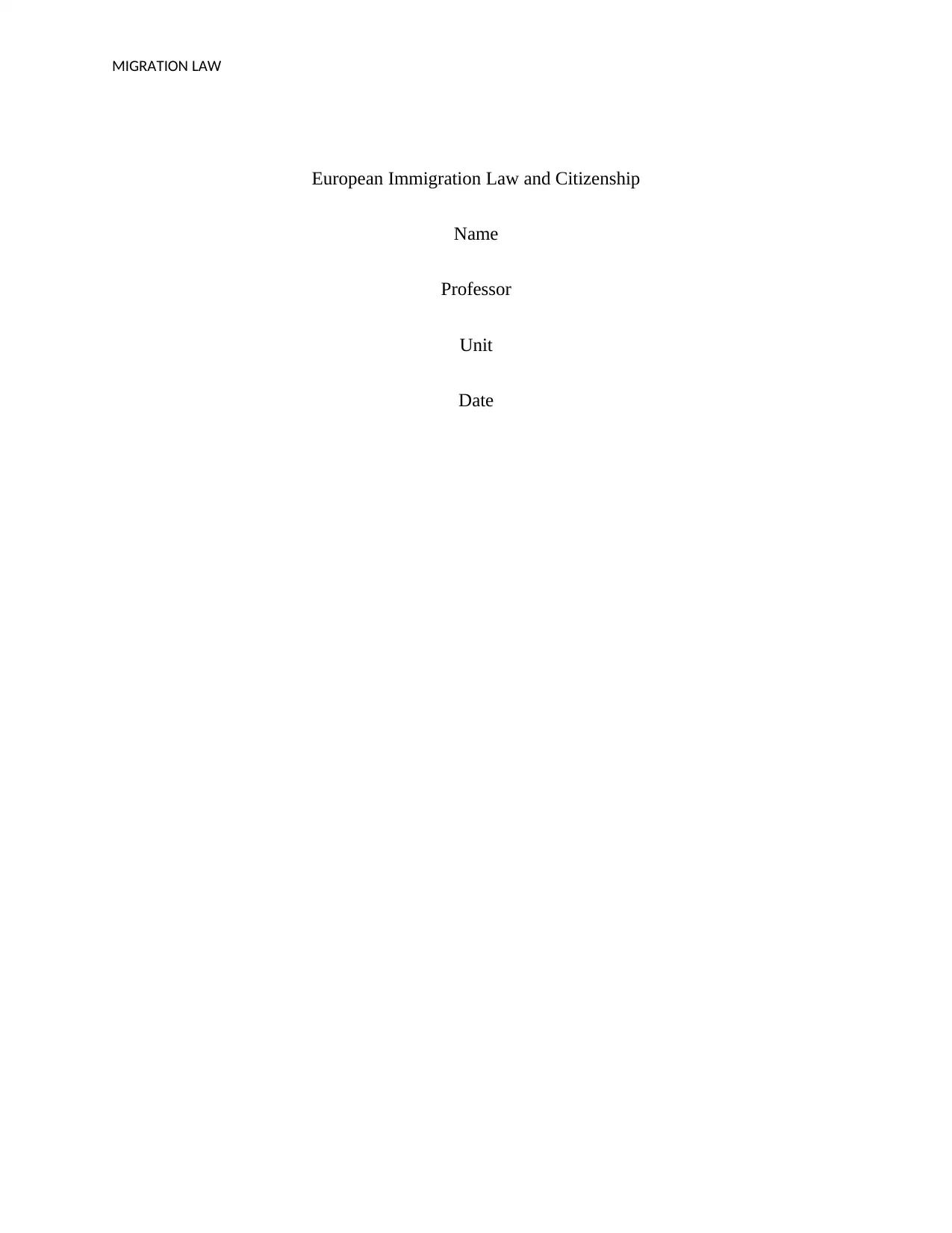
MIGRATION LAW
European Immigration Law and Citizenship
Name
Professor
Unit
Date
European Immigration Law and Citizenship
Name
Professor
Unit
Date
Paraphrase This Document
Need a fresh take? Get an instant paraphrase of this document with our AI Paraphraser
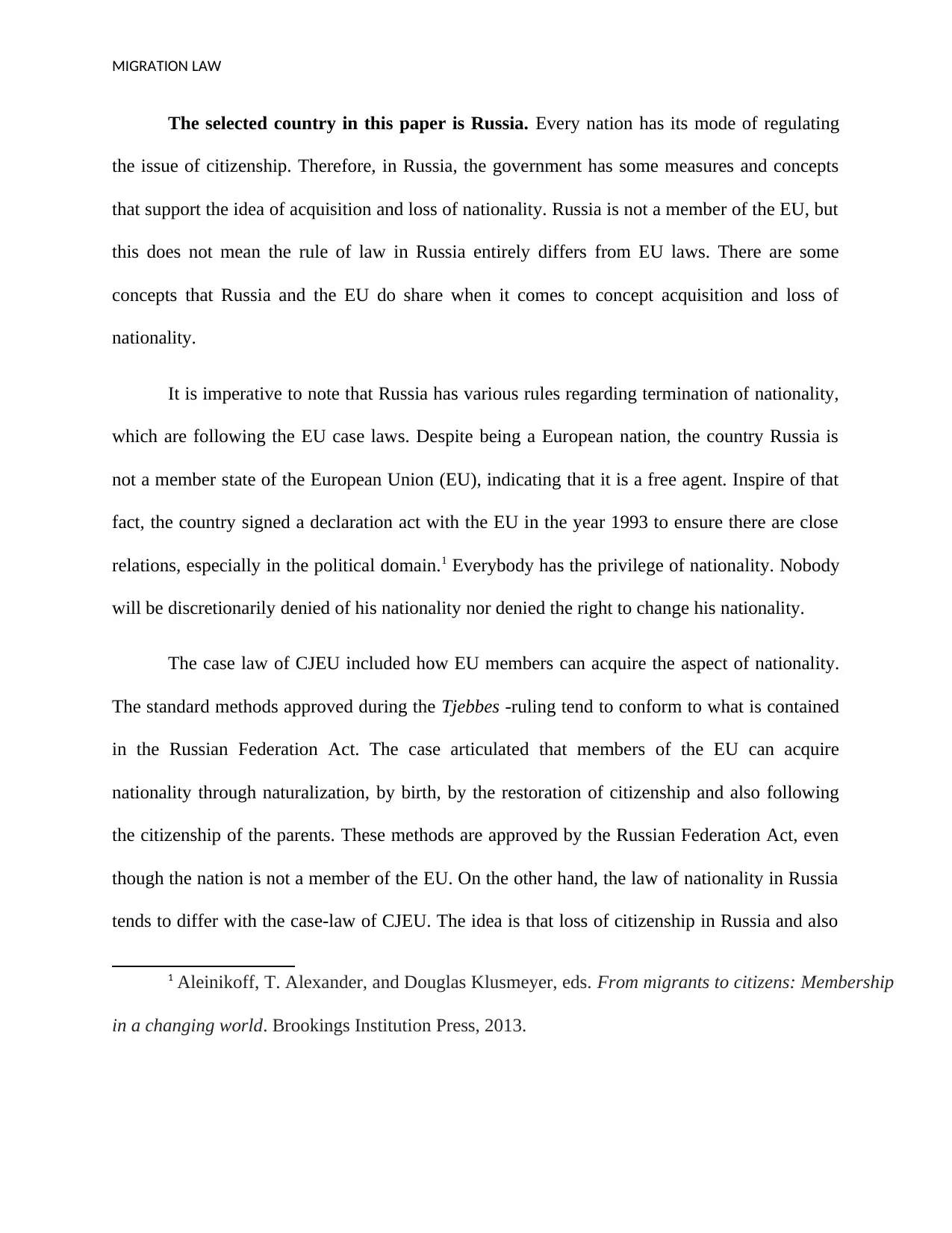
MIGRATION LAW
The selected country in this paper is Russia. Every nation has its mode of regulating
the issue of citizenship. Therefore, in Russia, the government has some measures and concepts
that support the idea of acquisition and loss of nationality. Russia is not a member of the EU, but
this does not mean the rule of law in Russia entirely differs from EU laws. There are some
concepts that Russia and the EU do share when it comes to concept acquisition and loss of
nationality.
It is imperative to note that Russia has various rules regarding termination of nationality,
which are following the EU case laws. Despite being a European nation, the country Russia is
not a member state of the European Union (EU), indicating that it is a free agent. Inspire of that
fact, the country signed a declaration act with the EU in the year 1993 to ensure there are close
relations, especially in the political domain.1 Everybody has the privilege of nationality. Nobody
will be discretionarily denied of his nationality nor denied the right to change his nationality.
The case law of CJEU included how EU members can acquire the aspect of nationality.
The standard methods approved during the Tjebbes -ruling tend to conform to what is contained
in the Russian Federation Act. The case articulated that members of the EU can acquire
nationality through naturalization, by birth, by the restoration of citizenship and also following
the citizenship of the parents. These methods are approved by the Russian Federation Act, even
though the nation is not a member of the EU. On the other hand, the law of nationality in Russia
tends to differ with the case-law of CJEU. The idea is that loss of citizenship in Russia and also
1 Aleinikoff, T. Alexander, and Douglas Klusmeyer, eds. From migrants to citizens: Membership
in a changing world. Brookings Institution Press, 2013.
The selected country in this paper is Russia. Every nation has its mode of regulating
the issue of citizenship. Therefore, in Russia, the government has some measures and concepts
that support the idea of acquisition and loss of nationality. Russia is not a member of the EU, but
this does not mean the rule of law in Russia entirely differs from EU laws. There are some
concepts that Russia and the EU do share when it comes to concept acquisition and loss of
nationality.
It is imperative to note that Russia has various rules regarding termination of nationality,
which are following the EU case laws. Despite being a European nation, the country Russia is
not a member state of the European Union (EU), indicating that it is a free agent. Inspire of that
fact, the country signed a declaration act with the EU in the year 1993 to ensure there are close
relations, especially in the political domain.1 Everybody has the privilege of nationality. Nobody
will be discretionarily denied of his nationality nor denied the right to change his nationality.
The case law of CJEU included how EU members can acquire the aspect of nationality.
The standard methods approved during the Tjebbes -ruling tend to conform to what is contained
in the Russian Federation Act. The case articulated that members of the EU can acquire
nationality through naturalization, by birth, by the restoration of citizenship and also following
the citizenship of the parents. These methods are approved by the Russian Federation Act, even
though the nation is not a member of the EU. On the other hand, the law of nationality in Russia
tends to differ with the case-law of CJEU. The idea is that loss of citizenship in Russia and also
1 Aleinikoff, T. Alexander, and Douglas Klusmeyer, eds. From migrants to citizens: Membership
in a changing world. Brookings Institution Press, 2013.
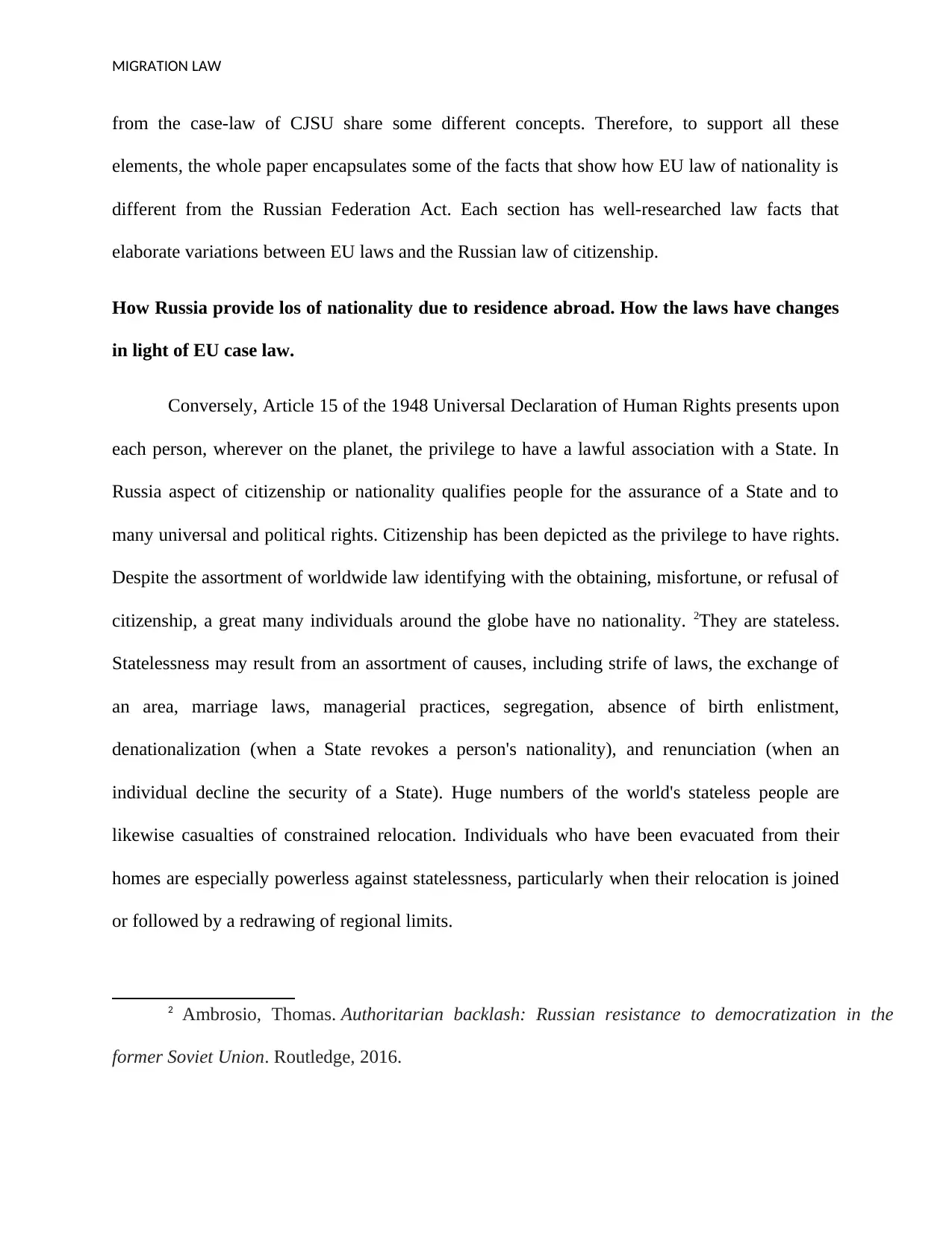
MIGRATION LAW
from the case-law of CJSU share some different concepts. Therefore, to support all these
elements, the whole paper encapsulates some of the facts that show how EU law of nationality is
different from the Russian Federation Act. Each section has well-researched law facts that
elaborate variations between EU laws and the Russian law of citizenship.
How Russia provide los of nationality due to residence abroad. How the laws have changes
in light of EU case law.
Conversely, Article 15 of the 1948 Universal Declaration of Human Rights presents upon
each person, wherever on the planet, the privilege to have a lawful association with a State. In
Russia aspect of citizenship or nationality qualifies people for the assurance of a State and to
many universal and political rights. Citizenship has been depicted as the privilege to have rights.
Despite the assortment of worldwide law identifying with the obtaining, misfortune, or refusal of
citizenship, a great many individuals around the globe have no nationality. 2They are stateless.
Statelessness may result from an assortment of causes, including strife of laws, the exchange of
an area, marriage laws, managerial practices, segregation, absence of birth enlistment,
denationalization (when a State revokes a person's nationality), and renunciation (when an
individual decline the security of a State). Huge numbers of the world's stateless people are
likewise casualties of constrained relocation. Individuals who have been evacuated from their
homes are especially powerless against statelessness, particularly when their relocation is joined
or followed by a redrawing of regional limits.
2 Ambrosio, Thomas. Authoritarian backlash: Russian resistance to democratization in the
former Soviet Union. Routledge, 2016.
from the case-law of CJSU share some different concepts. Therefore, to support all these
elements, the whole paper encapsulates some of the facts that show how EU law of nationality is
different from the Russian Federation Act. Each section has well-researched law facts that
elaborate variations between EU laws and the Russian law of citizenship.
How Russia provide los of nationality due to residence abroad. How the laws have changes
in light of EU case law.
Conversely, Article 15 of the 1948 Universal Declaration of Human Rights presents upon
each person, wherever on the planet, the privilege to have a lawful association with a State. In
Russia aspect of citizenship or nationality qualifies people for the assurance of a State and to
many universal and political rights. Citizenship has been depicted as the privilege to have rights.
Despite the assortment of worldwide law identifying with the obtaining, misfortune, or refusal of
citizenship, a great many individuals around the globe have no nationality. 2They are stateless.
Statelessness may result from an assortment of causes, including strife of laws, the exchange of
an area, marriage laws, managerial practices, segregation, absence of birth enlistment,
denationalization (when a State revokes a person's nationality), and renunciation (when an
individual decline the security of a State). Huge numbers of the world's stateless people are
likewise casualties of constrained relocation. Individuals who have been evacuated from their
homes are especially powerless against statelessness, particularly when their relocation is joined
or followed by a redrawing of regional limits.
2 Ambrosio, Thomas. Authoritarian backlash: Russian resistance to democratization in the
former Soviet Union. Routledge, 2016.
⊘ This is a preview!⊘
Do you want full access?
Subscribe today to unlock all pages.

Trusted by 1+ million students worldwide
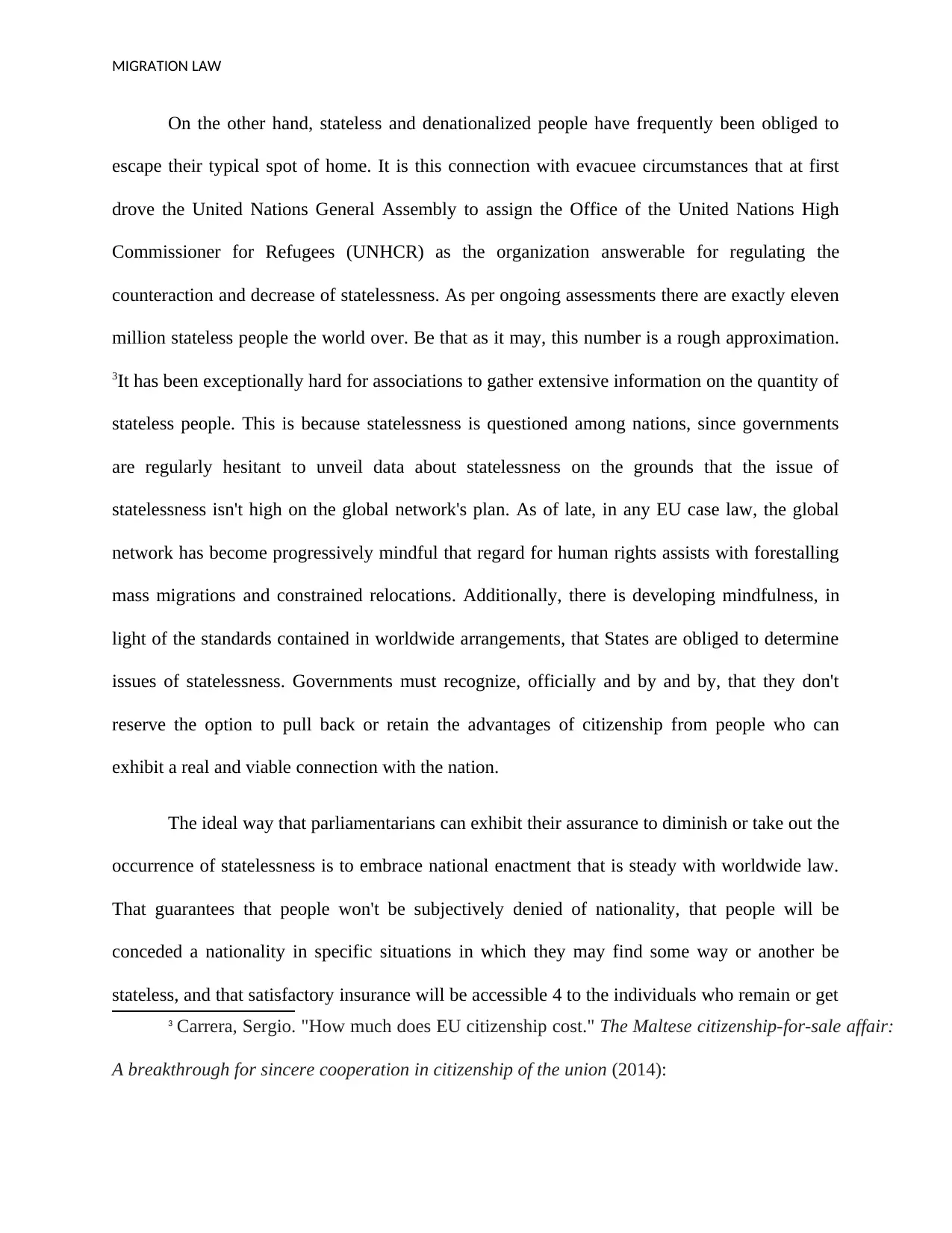
MIGRATION LAW
On the other hand, stateless and denationalized people have frequently been obliged to
escape their typical spot of home. It is this connection with evacuee circumstances that at first
drove the United Nations General Assembly to assign the Office of the United Nations High
Commissioner for Refugees (UNHCR) as the organization answerable for regulating the
counteraction and decrease of statelessness. As per ongoing assessments there are exactly eleven
million stateless people the world over. Be that as it may, this number is a rough approximation.
3It has been exceptionally hard for associations to gather extensive information on the quantity of
stateless people. This is because statelessness is questioned among nations, since governments
are regularly hesitant to unveil data about statelessness on the grounds that the issue of
statelessness isn't high on the global network's plan. As of late, in any EU case law, the global
network has become progressively mindful that regard for human rights assists with forestalling
mass migrations and constrained relocations. Additionally, there is developing mindfulness, in
light of the standards contained in worldwide arrangements, that States are obliged to determine
issues of statelessness. Governments must recognize, officially and by and by, that they don't
reserve the option to pull back or retain the advantages of citizenship from people who can
exhibit a real and viable connection with the nation.
The ideal way that parliamentarians can exhibit their assurance to diminish or take out the
occurrence of statelessness is to embrace national enactment that is steady with worldwide law.
That guarantees that people won't be subjectively denied of nationality, that people will be
conceded a nationality in specific situations in which they may find some way or another be
stateless, and that satisfactory insurance will be accessible 4 to the individuals who remain or get
3 Carrera, Sergio. "How much does EU citizenship cost." The Maltese citizenship-for-sale affair:
A breakthrough for sincere cooperation in citizenship of the union (2014):
On the other hand, stateless and denationalized people have frequently been obliged to
escape their typical spot of home. It is this connection with evacuee circumstances that at first
drove the United Nations General Assembly to assign the Office of the United Nations High
Commissioner for Refugees (UNHCR) as the organization answerable for regulating the
counteraction and decrease of statelessness. As per ongoing assessments there are exactly eleven
million stateless people the world over. Be that as it may, this number is a rough approximation.
3It has been exceptionally hard for associations to gather extensive information on the quantity of
stateless people. This is because statelessness is questioned among nations, since governments
are regularly hesitant to unveil data about statelessness on the grounds that the issue of
statelessness isn't high on the global network's plan. As of late, in any EU case law, the global
network has become progressively mindful that regard for human rights assists with forestalling
mass migrations and constrained relocations. Additionally, there is developing mindfulness, in
light of the standards contained in worldwide arrangements, that States are obliged to determine
issues of statelessness. Governments must recognize, officially and by and by, that they don't
reserve the option to pull back or retain the advantages of citizenship from people who can
exhibit a real and viable connection with the nation.
The ideal way that parliamentarians can exhibit their assurance to diminish or take out the
occurrence of statelessness is to embrace national enactment that is steady with worldwide law.
That guarantees that people won't be subjectively denied of nationality, that people will be
conceded a nationality in specific situations in which they may find some way or another be
stateless, and that satisfactory insurance will be accessible 4 to the individuals who remain or get
3 Carrera, Sergio. "How much does EU citizenship cost." The Maltese citizenship-for-sale affair:
A breakthrough for sincere cooperation in citizenship of the union (2014):
Paraphrase This Document
Need a fresh take? Get an instant paraphrase of this document with our AI Paraphraser
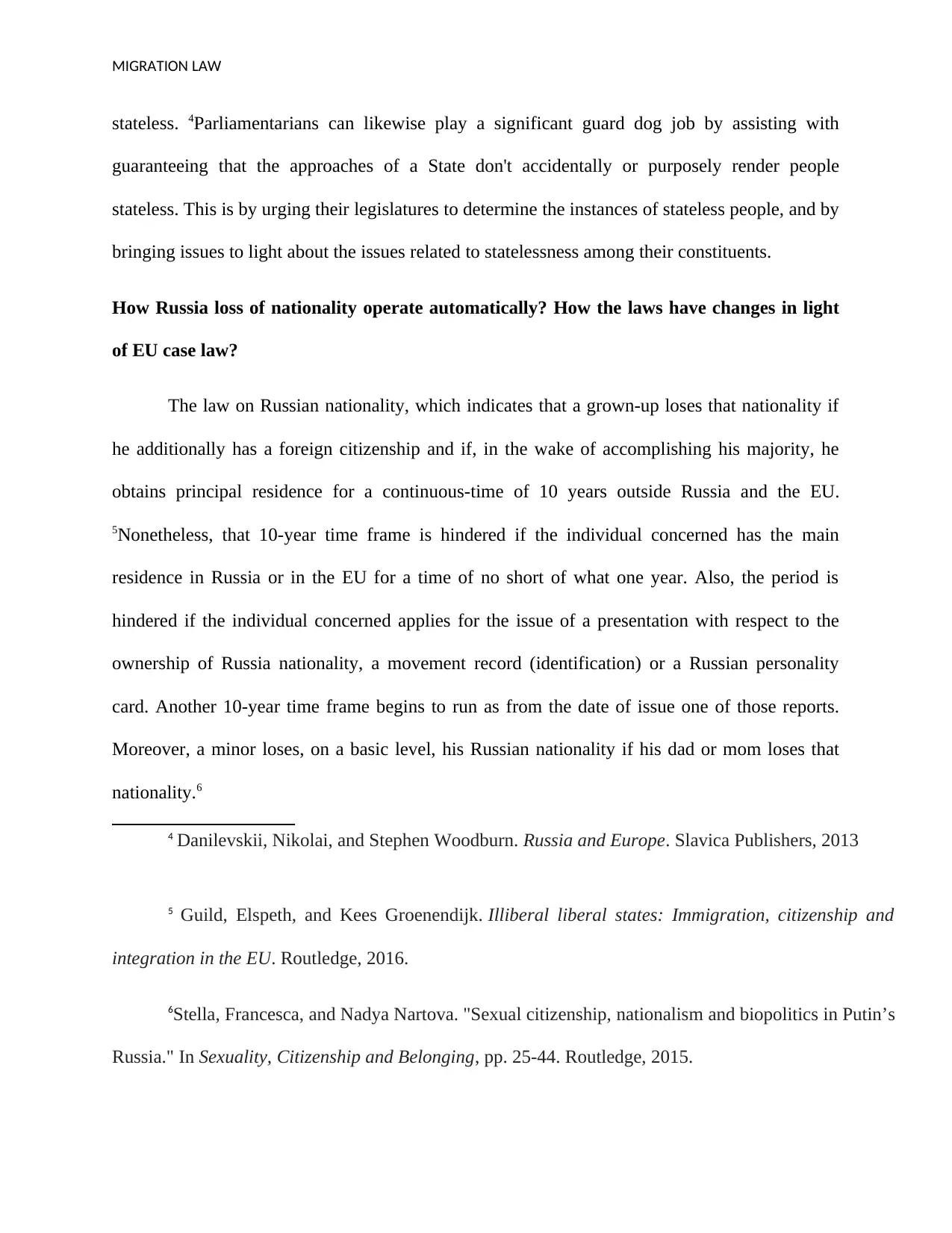
MIGRATION LAW
stateless. 4Parliamentarians can likewise play a significant guard dog job by assisting with
guaranteeing that the approaches of a State don't accidentally or purposely render people
stateless. This is by urging their legislatures to determine the instances of stateless people, and by
bringing issues to light about the issues related to statelessness among their constituents.
How Russia loss of nationality operate automatically? How the laws have changes in light
of EU case law?
The law on Russian nationality, which indicates that a grown-up loses that nationality if
he additionally has a foreign citizenship and if, in the wake of accomplishing his majority, he
obtains principal residence for a continuous-time of 10 years outside Russia and the EU.
5Nonetheless, that 10-year time frame is hindered if the individual concerned has the main
residence in Russia or in the EU for a time of no short of what one year. Also, the period is
hindered if the individual concerned applies for the issue of a presentation with respect to the
ownership of Russia nationality, a movement record (identification) or a Russian personality
card. Another 10-year time frame begins to run as from the date of issue one of those reports.
Moreover, a minor loses, on a basic level, his Russian nationality if his dad or mom loses that
nationality.6
4 Danilevskii, Nikolai, and Stephen Woodburn. Russia and Europe. Slavica Publishers, 2013
5 Guild, Elspeth, and Kees Groenendijk. Illiberal liberal states: Immigration, citizenship and
integration in the EU. Routledge, 2016.
6Stella, Francesca, and Nadya Nartova. "Sexual citizenship, nationalism and biopolitics in Putin’s
Russia." In Sexuality, Citizenship and Belonging, pp. 25-44. Routledge, 2015.
stateless. 4Parliamentarians can likewise play a significant guard dog job by assisting with
guaranteeing that the approaches of a State don't accidentally or purposely render people
stateless. This is by urging their legislatures to determine the instances of stateless people, and by
bringing issues to light about the issues related to statelessness among their constituents.
How Russia loss of nationality operate automatically? How the laws have changes in light
of EU case law?
The law on Russian nationality, which indicates that a grown-up loses that nationality if
he additionally has a foreign citizenship and if, in the wake of accomplishing his majority, he
obtains principal residence for a continuous-time of 10 years outside Russia and the EU.
5Nonetheless, that 10-year time frame is hindered if the individual concerned has the main
residence in Russia or in the EU for a time of no short of what one year. Also, the period is
hindered if the individual concerned applies for the issue of a presentation with respect to the
ownership of Russia nationality, a movement record (identification) or a Russian personality
card. Another 10-year time frame begins to run as from the date of issue one of those reports.
Moreover, a minor loses, on a basic level, his Russian nationality if his dad or mom loses that
nationality.6
4 Danilevskii, Nikolai, and Stephen Woodburn. Russia and Europe. Slavica Publishers, 2013
5 Guild, Elspeth, and Kees Groenendijk. Illiberal liberal states: Immigration, citizenship and
integration in the EU. Routledge, 2016.
6Stella, Francesca, and Nadya Nartova. "Sexual citizenship, nationalism and biopolitics in Putin’s
Russia." In Sexuality, Citizenship and Belonging, pp. 25-44. Routledge, 2015.
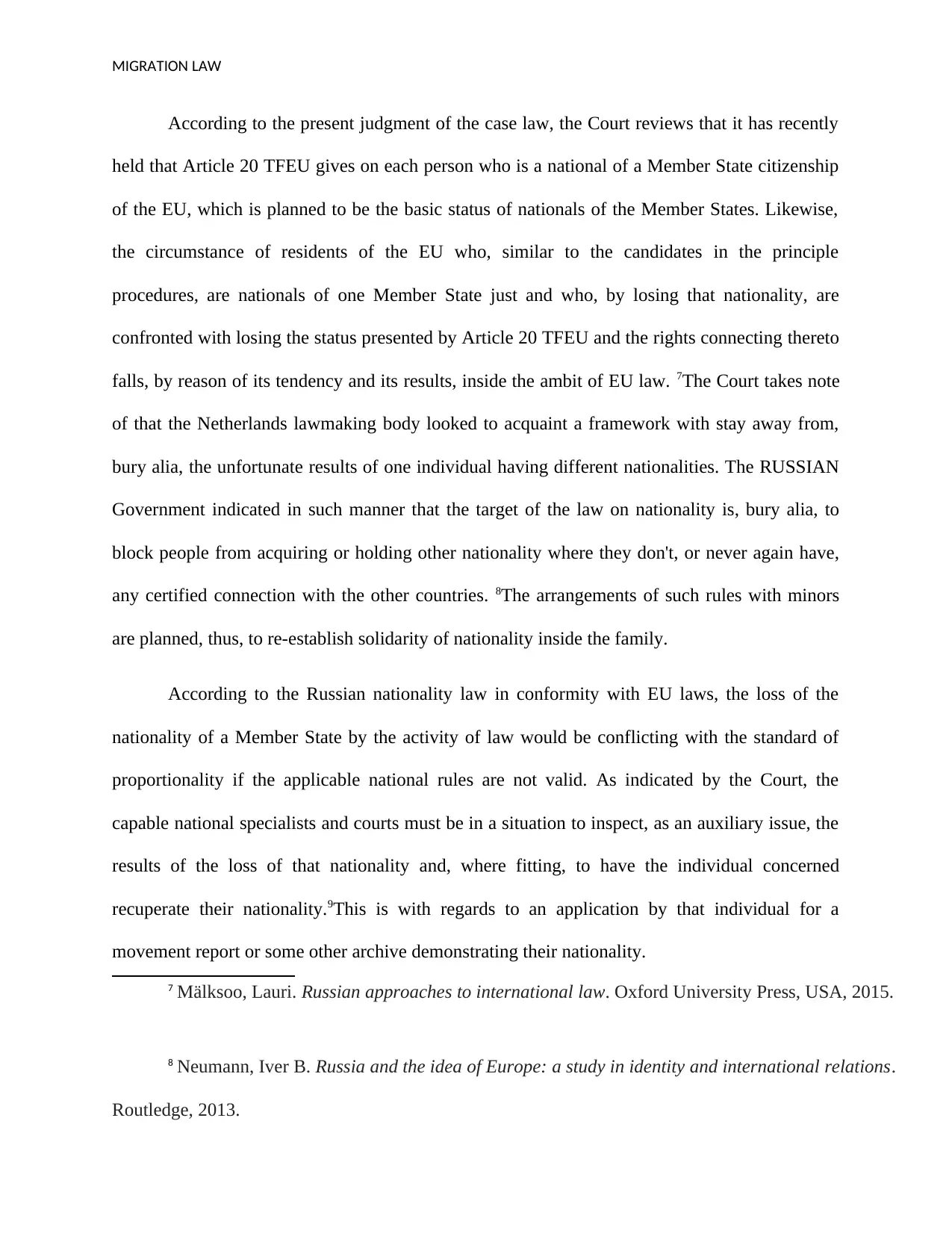
MIGRATION LAW
According to the present judgment of the case law, the Court reviews that it has recently
held that Article 20 TFEU gives on each person who is a national of a Member State citizenship
of the EU, which is planned to be the basic status of nationals of the Member States. Likewise,
the circumstance of residents of the EU who, similar to the candidates in the principle
procedures, are nationals of one Member State just and who, by losing that nationality, are
confronted with losing the status presented by Article 20 TFEU and the rights connecting thereto
falls, by reason of its tendency and its results, inside the ambit of EU law. 7The Court takes note
of that the Netherlands lawmaking body looked to acquaint a framework with stay away from,
bury alia, the unfortunate results of one individual having different nationalities. The RUSSIAN
Government indicated in such manner that the target of the law on nationality is, bury alia, to
block people from acquiring or holding other nationality where they don't, or never again have,
any certified connection with the other countries. 8The arrangements of such rules with minors
are planned, thus, to re-establish solidarity of nationality inside the family.
According to the Russian nationality law in conformity with EU laws, the loss of the
nationality of a Member State by the activity of law would be conflicting with the standard of
proportionality if the applicable national rules are not valid. As indicated by the Court, the
capable national specialists and courts must be in a situation to inspect, as an auxiliary issue, the
results of the loss of that nationality and, where fitting, to have the individual concerned
recuperate their nationality.9This is with regards to an application by that individual for a
movement report or some other archive demonstrating their nationality.
7 Mälksoo, Lauri. Russian approaches to international law. Oxford University Press, USA, 2015.
8 Neumann, Iver B. Russia and the idea of Europe: a study in identity and international relations.
Routledge, 2013.
According to the present judgment of the case law, the Court reviews that it has recently
held that Article 20 TFEU gives on each person who is a national of a Member State citizenship
of the EU, which is planned to be the basic status of nationals of the Member States. Likewise,
the circumstance of residents of the EU who, similar to the candidates in the principle
procedures, are nationals of one Member State just and who, by losing that nationality, are
confronted with losing the status presented by Article 20 TFEU and the rights connecting thereto
falls, by reason of its tendency and its results, inside the ambit of EU law. 7The Court takes note
of that the Netherlands lawmaking body looked to acquaint a framework with stay away from,
bury alia, the unfortunate results of one individual having different nationalities. The RUSSIAN
Government indicated in such manner that the target of the law on nationality is, bury alia, to
block people from acquiring or holding other nationality where they don't, or never again have,
any certified connection with the other countries. 8The arrangements of such rules with minors
are planned, thus, to re-establish solidarity of nationality inside the family.
According to the Russian nationality law in conformity with EU laws, the loss of the
nationality of a Member State by the activity of law would be conflicting with the standard of
proportionality if the applicable national rules are not valid. As indicated by the Court, the
capable national specialists and courts must be in a situation to inspect, as an auxiliary issue, the
results of the loss of that nationality and, where fitting, to have the individual concerned
recuperate their nationality.9This is with regards to an application by that individual for a
movement report or some other archive demonstrating their nationality.
7 Mälksoo, Lauri. Russian approaches to international law. Oxford University Press, USA, 2015.
8 Neumann, Iver B. Russia and the idea of Europe: a study in identity and international relations.
Routledge, 2013.
⊘ This is a preview!⊘
Do you want full access?
Subscribe today to unlock all pages.

Trusted by 1+ million students worldwide
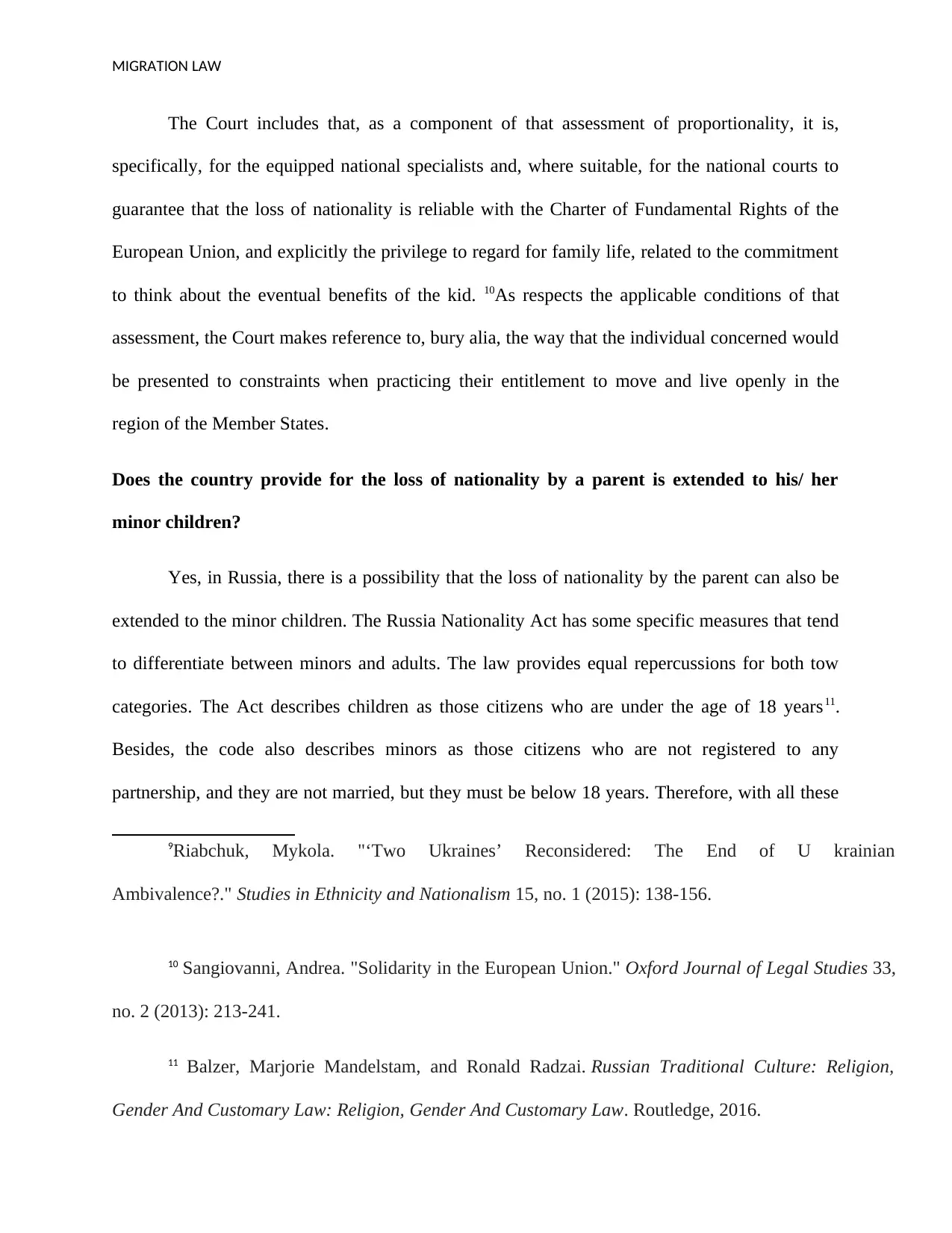
MIGRATION LAW
The Court includes that, as a component of that assessment of proportionality, it is,
specifically, for the equipped national specialists and, where suitable, for the national courts to
guarantee that the loss of nationality is reliable with the Charter of Fundamental Rights of the
European Union, and explicitly the privilege to regard for family life, related to the commitment
to think about the eventual benefits of the kid. 10As respects the applicable conditions of that
assessment, the Court makes reference to, bury alia, the way that the individual concerned would
be presented to constraints when practicing their entitlement to move and live openly in the
region of the Member States.
Does the country provide for the loss of nationality by a parent is extended to his/ her
minor children?
Yes, in Russia, there is a possibility that the loss of nationality by the parent can also be
extended to the minor children. The Russia Nationality Act has some specific measures that tend
to differentiate between minors and adults. The law provides equal repercussions for both tow
categories. The Act describes children as those citizens who are under the age of 18 years11.
Besides, the code also describes minors as those citizens who are not registered to any
partnership, and they are not married, but they must be below 18 years. Therefore, with all these
9Riabchuk, Mykola. "‘Two Ukraines’ Reconsidered: The End of U krainian
Ambivalence?." Studies in Ethnicity and Nationalism 15, no. 1 (2015): 138-156.
10 Sangiovanni, Andrea. "Solidarity in the European Union." Oxford Journal of Legal Studies 33,
no. 2 (2013): 213-241.
11 Balzer, Marjorie Mandelstam, and Ronald Radzai. Russian Traditional Culture: Religion,
Gender And Customary Law: Religion, Gender And Customary Law. Routledge, 2016.
The Court includes that, as a component of that assessment of proportionality, it is,
specifically, for the equipped national specialists and, where suitable, for the national courts to
guarantee that the loss of nationality is reliable with the Charter of Fundamental Rights of the
European Union, and explicitly the privilege to regard for family life, related to the commitment
to think about the eventual benefits of the kid. 10As respects the applicable conditions of that
assessment, the Court makes reference to, bury alia, the way that the individual concerned would
be presented to constraints when practicing their entitlement to move and live openly in the
region of the Member States.
Does the country provide for the loss of nationality by a parent is extended to his/ her
minor children?
Yes, in Russia, there is a possibility that the loss of nationality by the parent can also be
extended to the minor children. The Russia Nationality Act has some specific measures that tend
to differentiate between minors and adults. The law provides equal repercussions for both tow
categories. The Act describes children as those citizens who are under the age of 18 years11.
Besides, the code also describes minors as those citizens who are not registered to any
partnership, and they are not married, but they must be below 18 years. Therefore, with all these
9Riabchuk, Mykola. "‘Two Ukraines’ Reconsidered: The End of U krainian
Ambivalence?." Studies in Ethnicity and Nationalism 15, no. 1 (2015): 138-156.
10 Sangiovanni, Andrea. "Solidarity in the European Union." Oxford Journal of Legal Studies 33,
no. 2 (2013): 213-241.
11 Balzer, Marjorie Mandelstam, and Ronald Radzai. Russian Traditional Culture: Religion,
Gender And Customary Law: Religion, Gender And Customary Law. Routledge, 2016.
Paraphrase This Document
Need a fresh take? Get an instant paraphrase of this document with our AI Paraphraser
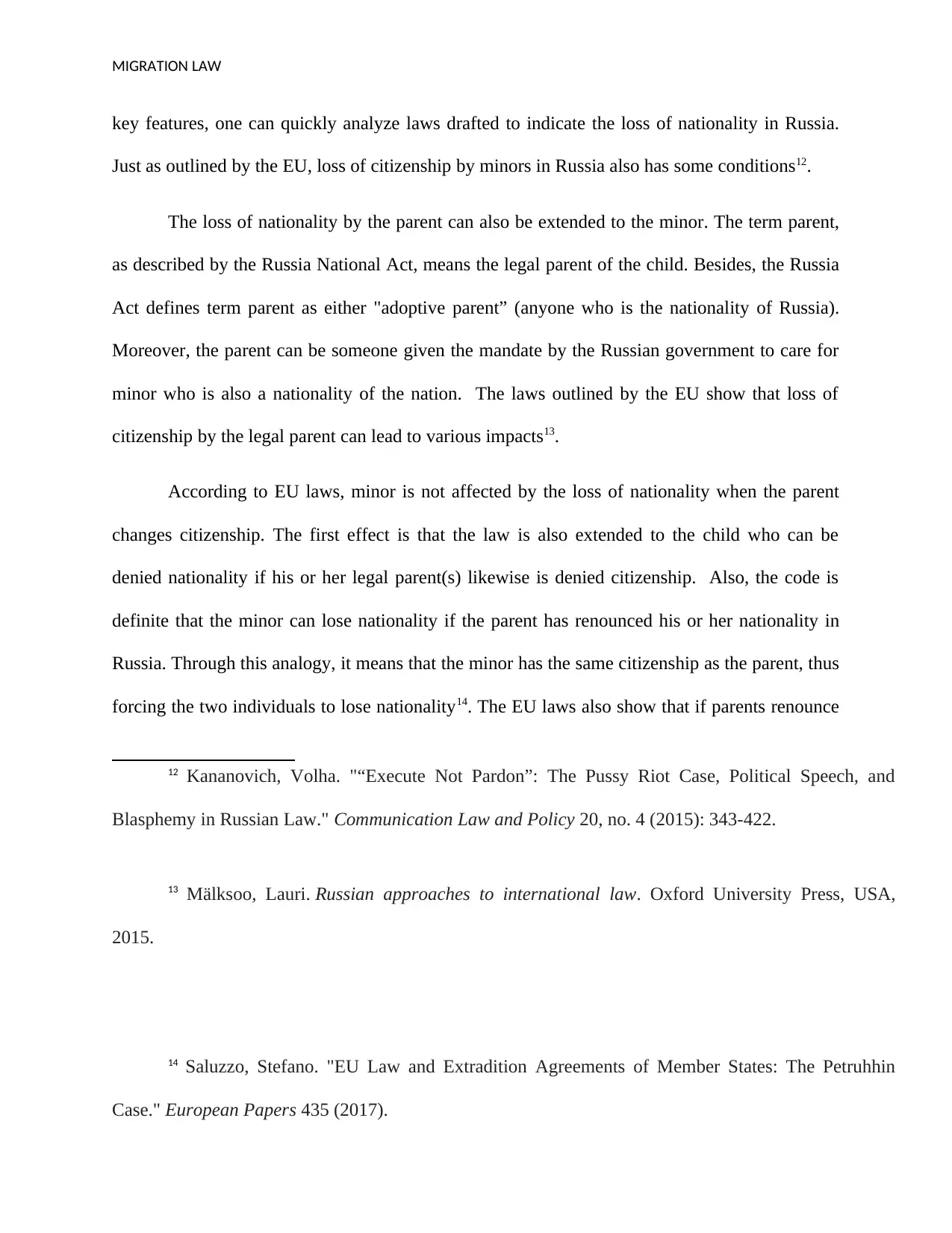
MIGRATION LAW
key features, one can quickly analyze laws drafted to indicate the loss of nationality in Russia.
Just as outlined by the EU, loss of citizenship by minors in Russia also has some conditions12.
The loss of nationality by the parent can also be extended to the minor. The term parent,
as described by the Russia National Act, means the legal parent of the child. Besides, the Russia
Act defines term parent as either "adoptive parent” (anyone who is the nationality of Russia).
Moreover, the parent can be someone given the mandate by the Russian government to care for
minor who is also a nationality of the nation. The laws outlined by the EU show that loss of
citizenship by the legal parent can lead to various impacts13.
According to EU laws, minor is not affected by the loss of nationality when the parent
changes citizenship. The first effect is that the law is also extended to the child who can be
denied nationality if his or her legal parent(s) likewise is denied citizenship. Also, the code is
definite that the minor can lose nationality if the parent has renounced his or her nationality in
Russia. Through this analogy, it means that the minor has the same citizenship as the parent, thus
forcing the two individuals to lose nationality14. The EU laws also show that if parents renounce
12 Kananovich, Volha. "“Execute Not Pardon”: The Pussy Riot Case, Political Speech, and
Blasphemy in Russian Law." Communication Law and Policy 20, no. 4 (2015): 343-422.
13 Mälksoo, Lauri. Russian approaches to international law. Oxford University Press, USA,
2015.
14 Saluzzo, Stefano. "EU Law and Extradition Agreements of Member States: The Petruhhin
Case." European Papers 435 (2017).
key features, one can quickly analyze laws drafted to indicate the loss of nationality in Russia.
Just as outlined by the EU, loss of citizenship by minors in Russia also has some conditions12.
The loss of nationality by the parent can also be extended to the minor. The term parent,
as described by the Russia National Act, means the legal parent of the child. Besides, the Russia
Act defines term parent as either "adoptive parent” (anyone who is the nationality of Russia).
Moreover, the parent can be someone given the mandate by the Russian government to care for
minor who is also a nationality of the nation. The laws outlined by the EU show that loss of
citizenship by the legal parent can lead to various impacts13.
According to EU laws, minor is not affected by the loss of nationality when the parent
changes citizenship. The first effect is that the law is also extended to the child who can be
denied nationality if his or her legal parent(s) likewise is denied citizenship. Also, the code is
definite that the minor can lose nationality if the parent has renounced his or her nationality in
Russia. Through this analogy, it means that the minor has the same citizenship as the parent, thus
forcing the two individuals to lose nationality14. The EU laws also show that if parents renounce
12 Kananovich, Volha. "“Execute Not Pardon”: The Pussy Riot Case, Political Speech, and
Blasphemy in Russian Law." Communication Law and Policy 20, no. 4 (2015): 343-422.
13 Mälksoo, Lauri. Russian approaches to international law. Oxford University Press, USA,
2015.
14 Saluzzo, Stefano. "EU Law and Extradition Agreements of Member States: The Petruhhin
Case." European Papers 435 (2017).
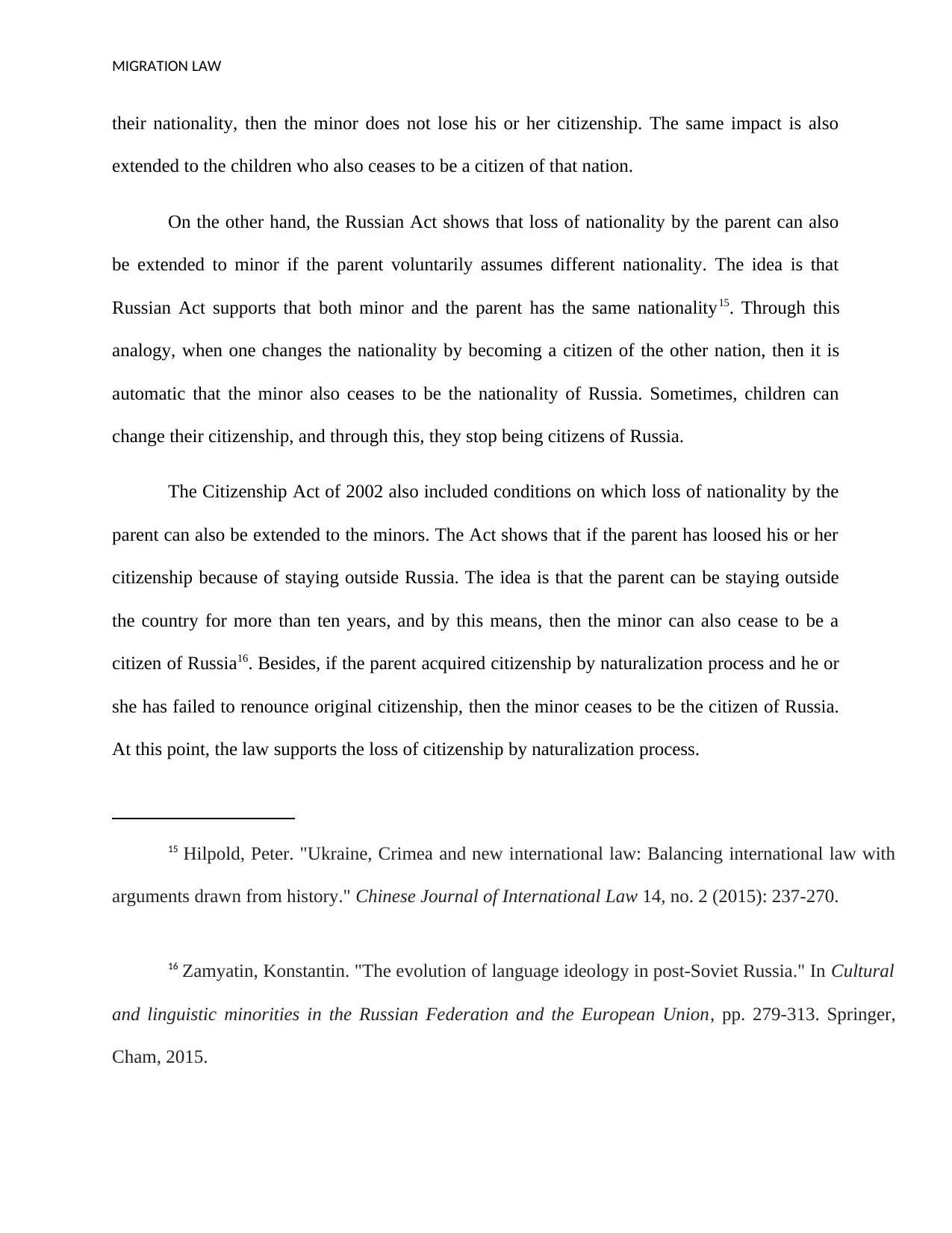
MIGRATION LAW
their nationality, then the minor does not lose his or her citizenship. The same impact is also
extended to the children who also ceases to be a citizen of that nation.
On the other hand, the Russian Act shows that loss of nationality by the parent can also
be extended to minor if the parent voluntarily assumes different nationality. The idea is that
Russian Act supports that both minor and the parent has the same nationality15. Through this
analogy, when one changes the nationality by becoming a citizen of the other nation, then it is
automatic that the minor also ceases to be the nationality of Russia. Sometimes, children can
change their citizenship, and through this, they stop being citizens of Russia.
The Citizenship Act of 2002 also included conditions on which loss of nationality by the
parent can also be extended to the minors. The Act shows that if the parent has loosed his or her
citizenship because of staying outside Russia. The idea is that the parent can be staying outside
the country for more than ten years, and by this means, then the minor can also cease to be a
citizen of Russia16. Besides, if the parent acquired citizenship by naturalization process and he or
she has failed to renounce original citizenship, then the minor ceases to be the citizen of Russia.
At this point, the law supports the loss of citizenship by naturalization process.
15 Hilpold, Peter. "Ukraine, Crimea and new international law: Balancing international law with
arguments drawn from history." Chinese Journal of International Law 14, no. 2 (2015): 237-270.
16 Zamyatin, Konstantin. "The evolution of language ideology in post-Soviet Russia." In Cultural
and linguistic minorities in the Russian Federation and the European Union, pp. 279-313. Springer,
Cham, 2015.
their nationality, then the minor does not lose his or her citizenship. The same impact is also
extended to the children who also ceases to be a citizen of that nation.
On the other hand, the Russian Act shows that loss of nationality by the parent can also
be extended to minor if the parent voluntarily assumes different nationality. The idea is that
Russian Act supports that both minor and the parent has the same nationality15. Through this
analogy, when one changes the nationality by becoming a citizen of the other nation, then it is
automatic that the minor also ceases to be the nationality of Russia. Sometimes, children can
change their citizenship, and through this, they stop being citizens of Russia.
The Citizenship Act of 2002 also included conditions on which loss of nationality by the
parent can also be extended to the minors. The Act shows that if the parent has loosed his or her
citizenship because of staying outside Russia. The idea is that the parent can be staying outside
the country for more than ten years, and by this means, then the minor can also cease to be a
citizen of Russia16. Besides, if the parent acquired citizenship by naturalization process and he or
she has failed to renounce original citizenship, then the minor ceases to be the citizen of Russia.
At this point, the law supports the loss of citizenship by naturalization process.
15 Hilpold, Peter. "Ukraine, Crimea and new international law: Balancing international law with
arguments drawn from history." Chinese Journal of International Law 14, no. 2 (2015): 237-270.
16 Zamyatin, Konstantin. "The evolution of language ideology in post-Soviet Russia." In Cultural
and linguistic minorities in the Russian Federation and the European Union, pp. 279-313. Springer,
Cham, 2015.
⊘ This is a preview!⊘
Do you want full access?
Subscribe today to unlock all pages.

Trusted by 1+ million students worldwide
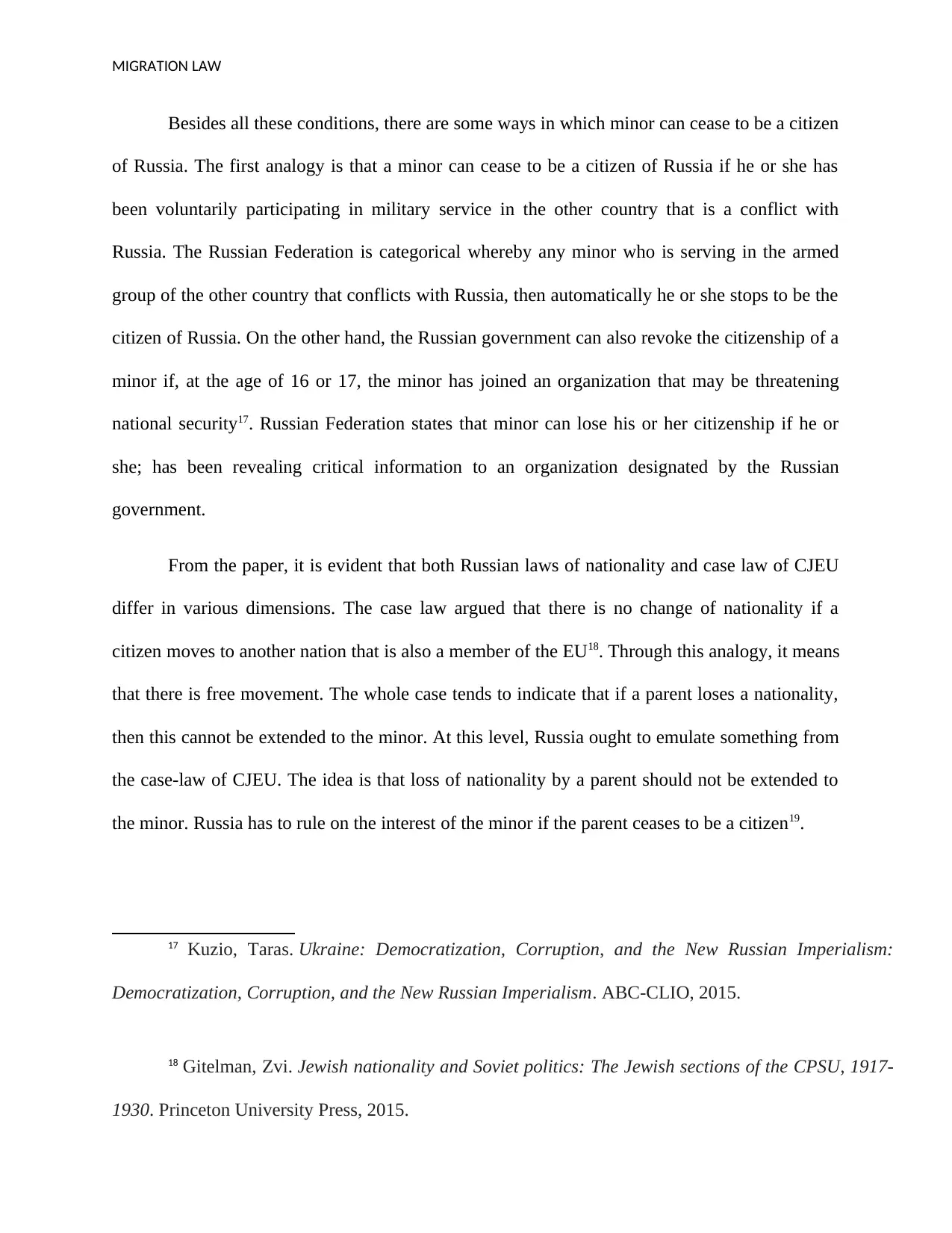
MIGRATION LAW
Besides all these conditions, there are some ways in which minor can cease to be a citizen
of Russia. The first analogy is that a minor can cease to be a citizen of Russia if he or she has
been voluntarily participating in military service in the other country that is a conflict with
Russia. The Russian Federation is categorical whereby any minor who is serving in the armed
group of the other country that conflicts with Russia, then automatically he or she stops to be the
citizen of Russia. On the other hand, the Russian government can also revoke the citizenship of a
minor if, at the age of 16 or 17, the minor has joined an organization that may be threatening
national security17. Russian Federation states that minor can lose his or her citizenship if he or
she; has been revealing critical information to an organization designated by the Russian
government.
From the paper, it is evident that both Russian laws of nationality and case law of CJEU
differ in various dimensions. The case law argued that there is no change of nationality if a
citizen moves to another nation that is also a member of the EU18. Through this analogy, it means
that there is free movement. The whole case tends to indicate that if a parent loses a nationality,
then this cannot be extended to the minor. At this level, Russia ought to emulate something from
the case-law of CJEU. The idea is that loss of nationality by a parent should not be extended to
the minor. Russia has to rule on the interest of the minor if the parent ceases to be a citizen19.
17 Kuzio, Taras. Ukraine: Democratization, Corruption, and the New Russian Imperialism:
Democratization, Corruption, and the New Russian Imperialism. ABC-CLIO, 2015.
18 Gitelman, Zvi. Jewish nationality and Soviet politics: The Jewish sections of the CPSU, 1917-
1930. Princeton University Press, 2015.
Besides all these conditions, there are some ways in which minor can cease to be a citizen
of Russia. The first analogy is that a minor can cease to be a citizen of Russia if he or she has
been voluntarily participating in military service in the other country that is a conflict with
Russia. The Russian Federation is categorical whereby any minor who is serving in the armed
group of the other country that conflicts with Russia, then automatically he or she stops to be the
citizen of Russia. On the other hand, the Russian government can also revoke the citizenship of a
minor if, at the age of 16 or 17, the minor has joined an organization that may be threatening
national security17. Russian Federation states that minor can lose his or her citizenship if he or
she; has been revealing critical information to an organization designated by the Russian
government.
From the paper, it is evident that both Russian laws of nationality and case law of CJEU
differ in various dimensions. The case law argued that there is no change of nationality if a
citizen moves to another nation that is also a member of the EU18. Through this analogy, it means
that there is free movement. The whole case tends to indicate that if a parent loses a nationality,
then this cannot be extended to the minor. At this level, Russia ought to emulate something from
the case-law of CJEU. The idea is that loss of nationality by a parent should not be extended to
the minor. Russia has to rule on the interest of the minor if the parent ceases to be a citizen19.
17 Kuzio, Taras. Ukraine: Democratization, Corruption, and the New Russian Imperialism:
Democratization, Corruption, and the New Russian Imperialism. ABC-CLIO, 2015.
18 Gitelman, Zvi. Jewish nationality and Soviet politics: The Jewish sections of the CPSU, 1917-
1930. Princeton University Press, 2015.
Paraphrase This Document
Need a fresh take? Get an instant paraphrase of this document with our AI Paraphraser
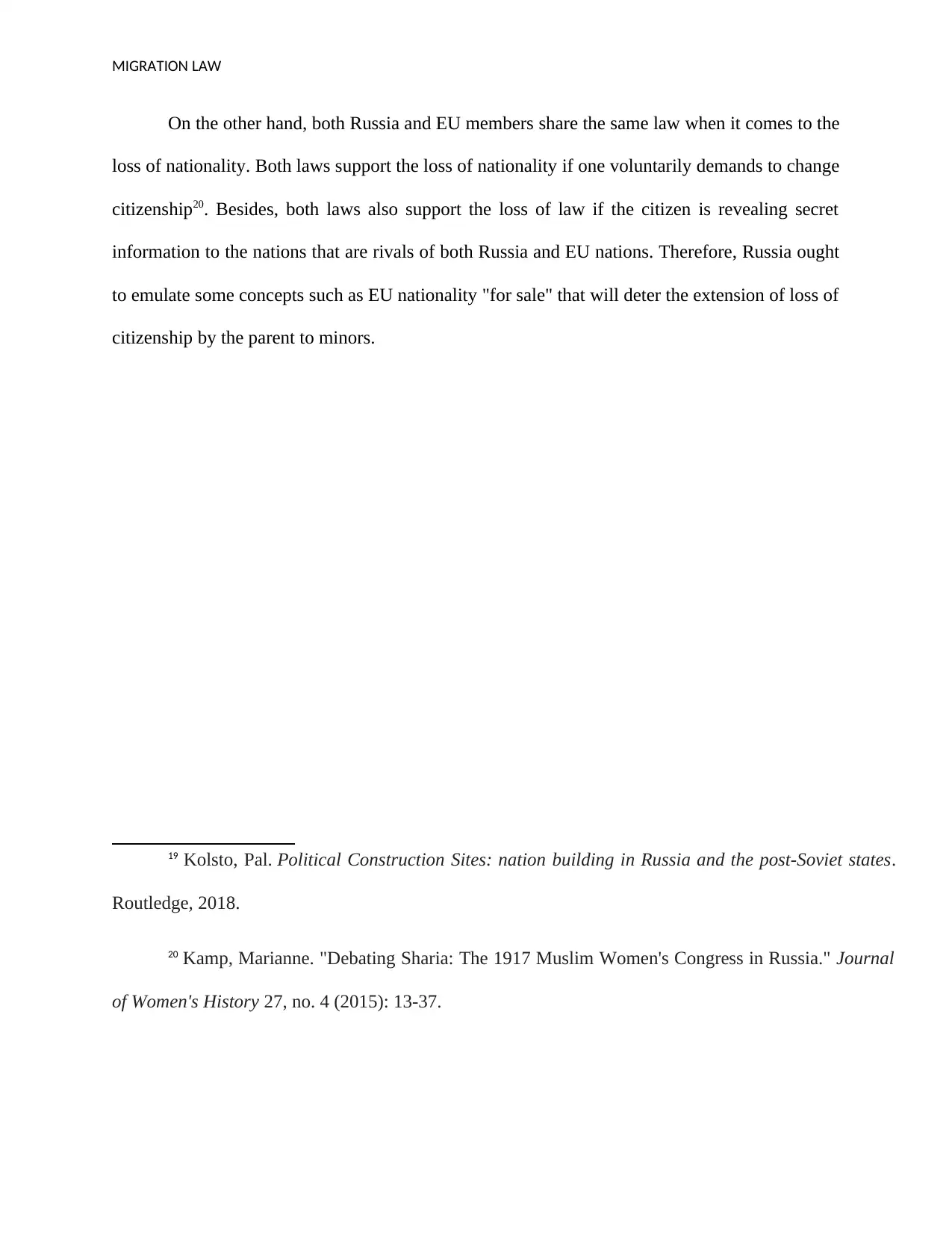
MIGRATION LAW
On the other hand, both Russia and EU members share the same law when it comes to the
loss of nationality. Both laws support the loss of nationality if one voluntarily demands to change
citizenship20. Besides, both laws also support the loss of law if the citizen is revealing secret
information to the nations that are rivals of both Russia and EU nations. Therefore, Russia ought
to emulate some concepts such as EU nationality "for sale" that will deter the extension of loss of
citizenship by the parent to minors.
19 Kolsto, Pal. Political Construction Sites: nation building in Russia and the post-Soviet states.
Routledge, 2018.
20 Kamp, Marianne. "Debating Sharia: The 1917 Muslim Women's Congress in Russia." Journal
of Women's History 27, no. 4 (2015): 13-37.
On the other hand, both Russia and EU members share the same law when it comes to the
loss of nationality. Both laws support the loss of nationality if one voluntarily demands to change
citizenship20. Besides, both laws also support the loss of law if the citizen is revealing secret
information to the nations that are rivals of both Russia and EU nations. Therefore, Russia ought
to emulate some concepts such as EU nationality "for sale" that will deter the extension of loss of
citizenship by the parent to minors.
19 Kolsto, Pal. Political Construction Sites: nation building in Russia and the post-Soviet states.
Routledge, 2018.
20 Kamp, Marianne. "Debating Sharia: The 1917 Muslim Women's Congress in Russia." Journal
of Women's History 27, no. 4 (2015): 13-37.
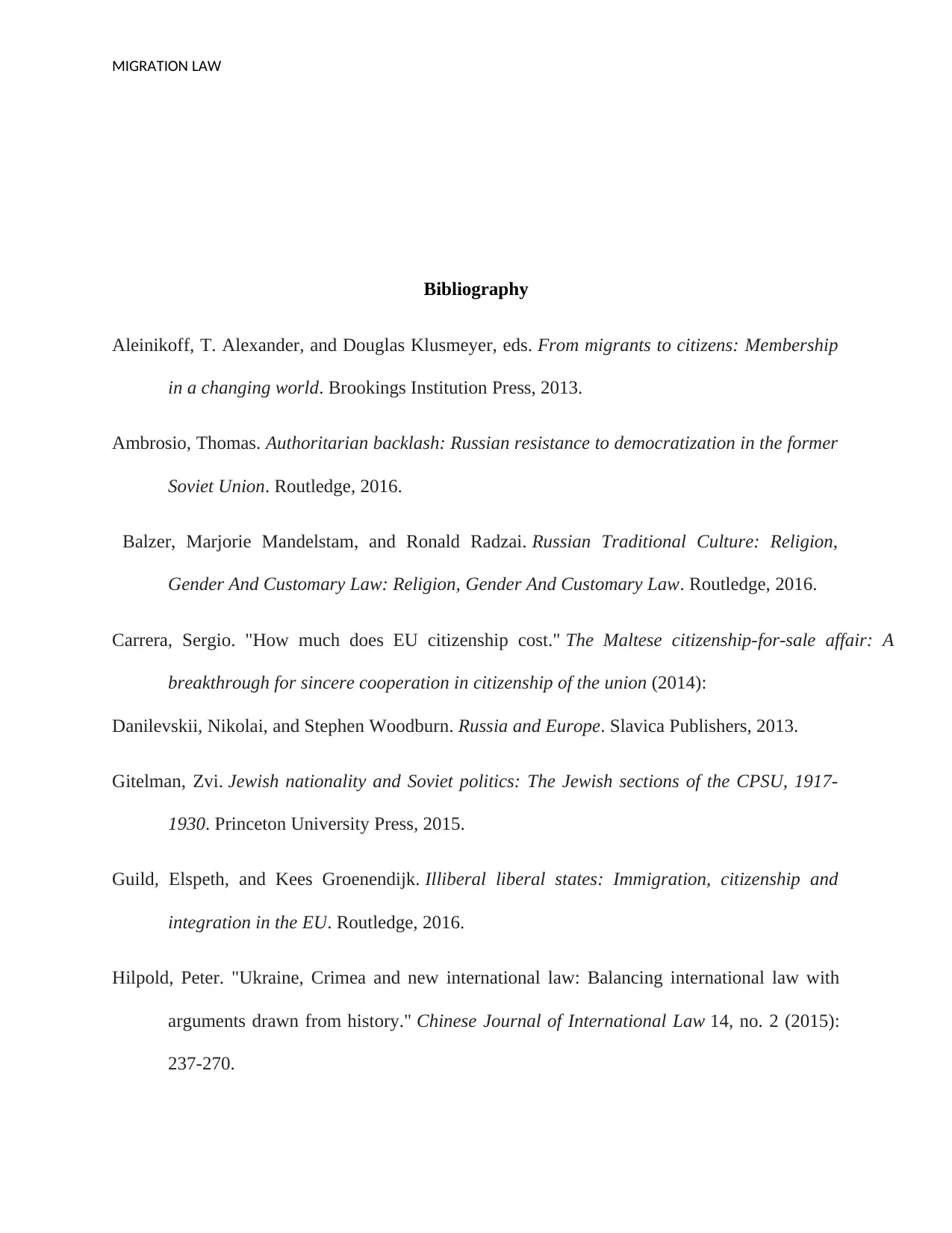
MIGRATION LAW
Bibliography
Aleinikoff, T. Alexander, and Douglas Klusmeyer, eds. From migrants to citizens: Membership
in a changing world. Brookings Institution Press, 2013.
Ambrosio, Thomas. Authoritarian backlash: Russian resistance to democratization in the former
Soviet Union. Routledge, 2016.
Balzer, Marjorie Mandelstam, and Ronald Radzai. Russian Traditional Culture: Religion,
Gender And Customary Law: Religion, Gender And Customary Law. Routledge, 2016.
Carrera, Sergio. "How much does EU citizenship cost." The Maltese citizenship-for-sale affair: A
breakthrough for sincere cooperation in citizenship of the union (2014):
Danilevskii, Nikolai, and Stephen Woodburn. Russia and Europe. Slavica Publishers, 2013.
Gitelman, Zvi. Jewish nationality and Soviet politics: The Jewish sections of the CPSU, 1917-
1930. Princeton University Press, 2015.
Guild, Elspeth, and Kees Groenendijk. Illiberal liberal states: Immigration, citizenship and
integration in the EU. Routledge, 2016.
Hilpold, Peter. "Ukraine, Crimea and new international law: Balancing international law with
arguments drawn from history." Chinese Journal of International Law 14, no. 2 (2015):
237-270.
Bibliography
Aleinikoff, T. Alexander, and Douglas Klusmeyer, eds. From migrants to citizens: Membership
in a changing world. Brookings Institution Press, 2013.
Ambrosio, Thomas. Authoritarian backlash: Russian resistance to democratization in the former
Soviet Union. Routledge, 2016.
Balzer, Marjorie Mandelstam, and Ronald Radzai. Russian Traditional Culture: Religion,
Gender And Customary Law: Religion, Gender And Customary Law. Routledge, 2016.
Carrera, Sergio. "How much does EU citizenship cost." The Maltese citizenship-for-sale affair: A
breakthrough for sincere cooperation in citizenship of the union (2014):
Danilevskii, Nikolai, and Stephen Woodburn. Russia and Europe. Slavica Publishers, 2013.
Gitelman, Zvi. Jewish nationality and Soviet politics: The Jewish sections of the CPSU, 1917-
1930. Princeton University Press, 2015.
Guild, Elspeth, and Kees Groenendijk. Illiberal liberal states: Immigration, citizenship and
integration in the EU. Routledge, 2016.
Hilpold, Peter. "Ukraine, Crimea and new international law: Balancing international law with
arguments drawn from history." Chinese Journal of International Law 14, no. 2 (2015):
237-270.
⊘ This is a preview!⊘
Do you want full access?
Subscribe today to unlock all pages.

Trusted by 1+ million students worldwide
1 out of 14
Related Documents
Your All-in-One AI-Powered Toolkit for Academic Success.
+13062052269
info@desklib.com
Available 24*7 on WhatsApp / Email
![[object Object]](/_next/static/media/star-bottom.7253800d.svg)
Unlock your academic potential
Copyright © 2020–2025 A2Z Services. All Rights Reserved. Developed and managed by ZUCOL.





